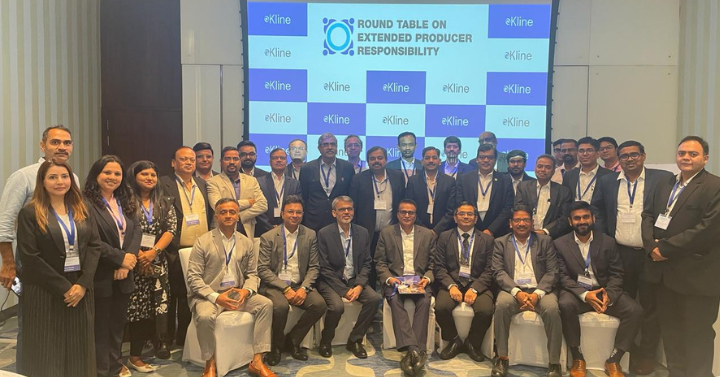Kline’s leadership role in providing strategic advice and insights to the global lubricants industry was on prominent display in March.

Sabrina Craciun and Annie Jarquin at Lube Expo North America
RRBO discussions at Lube Expo North America
The first Lube Expo on North American soil was held from March 19-21 in Detroit, attended by more than 1,000 delegates from major and independent lubricant marketers, as well as service and equipment suppliers to the lubricant industry. Senior members from Kline’s Energy Practice, Yana Wilkinson, Annie Jarquin and Dave Tsui, chaired three industry panels at Lube Expo, each covering different aspects of how the used oil re-refining industry, and lubricant marketers, can advance the cause of sustainability through gaining greater base acceptance for re-refined base oils in mainstream lubricants applications.
The viewpoint of the leading re-refiners is that, due to the continually improving quality of used oil, the great majority of re-refined base oil (RRBO) produced in North America can now meet, or even exceed, the quality of virgin Group II/II+ base oils; mainstream Group III RRBO is not far away. Continued growth in re-refining capacity in the region will require either modification of existing Vacuum Gas Oil (VGO) plants to produce base oils, as well as making further inroads into markets where used oil is currently burned. Regulations banning the burning of used oil in North America are unlikely, and so the industry will need to take the initiative in widening the net to increase used oil capture for regeneration.
From the standpoint of lubricant marketers, RRBO has become increasingly mainstream. While many of the leading lubricant marketers have embraced lubricant sustainability, it has become apparent that “Green Premium” is not a given for lubricants formulated in part or in whole with RRBO. But the situation is evolving, and nuanced customer segmentation is required to evaluate where the use of RRBO makes commercial sense as one of the quality formulation options vs the applications/customer segments where RRBO-based circularity credentials can warrant higher value.
The consensus view is that to progress, collective action is needed to continue educating customers and consumers as well as the broader industry ecosystem. Such education can only happen when there is a concerted action demonstrating the data-driven advantages and dispelling past biases. RRBO should be treated as a useful tool in the industry toolbox, by removing the stigma of “re-refined” from procurement programs, and that RRBO can now be interchangeable with conventional virgin base oils, on both performance and price, in many applications.

Attendees at Kline’s Round Table on Extended Producer Responsibility
Round Table Discussions with Industry Leaders on India’s Used Oil EPR scheme
In parallel, on March 21, Kline’s leading experts from our Delhi office, Milind Phadke, Satyan Gupta and Ruella Menezes, convened a forum of more than 30 senior executives representing lubricant producers, additive suppliers, Society of Indian Automotive Manufacturers (SIAM) – an association representing Indian automotive OEMs (Original equipment manufacturers), and officials from the Central Pollution Control Board (CPCB). CPCB is the nodal government agency responsible for operationalizing the Used Oil EPR scheme in the country.
This Round table discussion focused on the practical consequences associated with implementation of the EPR regulation, the latest version of which was published by the Ministry of Environment, Forest, and Climate Change on September 18, 2023. Kline facilitated a frank and open discussion between the public and private sector stakeholders around the goals and complexity of the proposed scheme, which obligates base oil and lubricant suppliers to procure EPR certificates equivalent to 50% of their base oil or finished lubricant sales by 2030. Kline will continue to play a leading role in bringing together the various parties to the Indian EPR scheme so that its goals are balanced, achievable, and focused on bringing about a comprehensive modernization of the Indian used oil re-refining industry.

The introduction of the Green Value Compass
Kline’s third initiative in sustainability in March was the launch of a new, proprietary product to the market, called the Green Value Compass. The Green Value Compass, or the GVC as the industry now knows it, is a unique offering from Kline which helps clients unlock and protect commercial value on their sustainability journey. The compass guides clients to their ‘true north’ — the commercial value of their investments — by assisting them in identifying growth opportunities, evaluating new revenue-generating streams, managing uncertainties, and assessing trade-offs.
The compass operates across the landscape of the ‘Green Core,’ which includes various green opportunities existing today and beyond, such as new fuels (including biofuels, e-fuels, methanol, ammonia and more), recycling technologies (plastic, battery, tire, and used oil recycling), biobased feedstocks, carbon capture and utilization (CCUS), and allied sustainability services such as EV (Electric Vehicle) charging and infrastructure for new fuels.
Kline’s Green Value Compass provides direction based on business intelligence, assisting business leaders in making uncertain investments with greater confidence, with the help of real-time market insights. For more information on the Green Value Compass or Kline’s other services in base oil and lubricant sustainability, please contact Annie Jarquin, Vice President, Energy.
Want energy industry updates, expert analysis, insider tips, and webinar invites in your inbox? Click here to sign up for the Kline newsletter.

